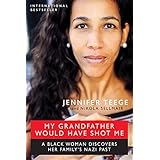regarding the stunning outing of NAACP chapter head, Rachel Dolezal, as a white woman. Shock and awe or much ado about nothing? Like many, I qualify my remarks by saying that I'm sorry that she felt she had to lie in order to be accepted as black. However, I don't for one minute not understand why she identifies as black.
As I've so often written, no one knows what goes on in a family, what the dynamics are, what perceived hurts are internalized to later return in unorthodox behaviors. But there is no doubt that when Rachel was a highly susceptible teenager her parents chose to adopt not one, not two, but four young black children to raise alongside their white daughter Rachel. One can speculate that she spent a great deal of time with these kids, babysitting and helping her mother in all aspects of their care. In fact, she is raising one of them now along with her own bi-racial child from her marriage to a black man.
I could go on and on but this situation is fodder for another post. However, I must say that I am very surprised (or am I?) that not one reporter has gone back to the quickly forgotten story of Jeb Bush's IRS returns - government documents in which he checked off his race as Hispanic. Everyone tittered and said, "oh, what a lovely tribute to his wife." Jeb Bush may "identify" as Hispanic but he is not Hispanic. Again, much ado about nothing?
So, this all brings me to a book that I read about last month in "Library Journal" and picked up last week at the amazingly well-stocked Calvert County Public Library.
"My Grandfather Would Have Shot Me, A Black Woman
Discovers Her Family's Nazi Past" is a remarkable story
 that adds another complex angle to this ongoing
that adds another complex angle to this ongoing conversation about race and identity.
Jennifer Teege (http://www.jennifer-teege.com/) was well into her thirties, a married mother of two sons, when she happened upon a book sitting on a library shelf in Berlin which told the story of her mother and grandmother and their connection to Amon Goeth, a commandant at a Nazi death camp brought to cold, horrifying life by Ralph Fiennes in the film, Schindler's List.
Jennifer's dad was Nigerian, her mother German. Her mother gave her up for adoption and she was raised in a white family. Though she visited her mother now and then, their relationship was fraught and her adopted family decided it would be better if Jennifer no longer heard from her mother.
Teege, though, did not identify with either her father's or with her adopted family's culture. In fact, she moved to Israel where she spent years studying, eventually earning an advanced degree and becoming fluent in Hebrew. Imagine the turmoil she must have suffered when she discovered that her grandfather was a Nazi officer and that her beloved grandmother lived with him as his mistress at the compound overlooking the death camp.
As a child who had been abandoned and later adopted into another family, Jennifer already had identity issues and suffered from sporadic bouts of depression. Fortunately her husband was completely supportive of her desire to face her past, deal with the ramifications, and eventually come to the realization that the sins of the fathers aren't always visited upon the proverbial sons (or daughters either).
Ms. Teege's memoir is extremely honest and well written. Her decision to partner with journalist Nikola Sellmair was inspired. Their chapters alternate with Jennifer's exuding the emotional side of her fateful discovery and Nikola filling in the necessary historical background details.
What struck me as particularly poignant was how Jennifer isolated herself from her Israeli friends for so long before she could bring herself to tell them her story. After all, wasn't she the same woman that she was before? The same friend? The same employee? Ultimately isn't the important thing not simply our color or culture but the unadorned face that we show to the world in our everyday actions?

No comments:
Post a Comment